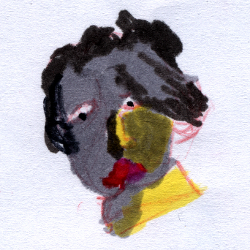Wait, Italian “ciao” is derived from (medieval) Latin “sclavus”/slave?
Yes, albeit indirectly - Italian borrowed it from Venetian sciao /stʃao/, that underwent the following sound changes:
- Latin /kl/ ⟨CL⟩ → */kj/ → Venetian /tʃ/. Regular.
- Latin /wu/ ⟨VV⟩ → Venetian /o/. Sometimes it fortifies to /vo/ instead, but there are other words where this happens (see e.g. pavonem “peacock” → paon)
Then Italian dropped the /s/ in the borrowing because, while /stʃ/ is a legal cluster in Venetian, it isn’t in Italian.
The semantic shift might look weird, but it pops up also in Austro-Bavarian and German “servus!” (hello) and Polish “serwus” (hello). Wiktionary mentions that the German greeting is from Mediaeval “seruus humillimus, domine spectabilis”; or “[I am a] humble servant, o notable lord”, odds are that Venetian “sciao” is the same.
Note that the purely native Italian cognate would be schiavo /skjavo/ “slave”.
EDIT: Dieguito answered as I wrote this answer, but I’m keeping it for further info.
I like yours better, your answer is far more extensive with explanation of the whole word and comparison with other languages.
About the “sc” pattern [st͡ʃ]: it is very peculiar of the Venetian dialect but is not present in standard Italian: another example would be "mas’cio” (meaning “pig” or “male”) from Latin “masculus” > *masclus > maschio (as in Italiano) > mas’cio.
Yes, passing through the Venetian vulgar where the “cla” cluster which evolved to modern Italian “-chia-” [ki̯a] is further palatalized to “cia” [t͡ʃa].
The original salute was meaning is “I am at your command”. In that region we still today, even it it’s rare / something that only elderly people do, use the form “mandi”, derived from “comandi” (i.e. again “at your commands”).
Small note, regarding English/German cognates with other Indo-European languages:
Unless you’re dealing with a Latinism or Hellenism, distrust any potential cognate starting with the same stop or fricative. They almost never match, because of a bunch of really old sound changes that Proto-Germanic went through:
- PIE *p t ḱ k kʷ → PGerm *f θ h h hʷ
- PIE *b d ǵ g gʷ → PGerm *p t k k kʷ
- PIE *bʰ dʰ ǵʰ gʰ gʷʰ → PGerm *b d g g gʷ
Those changes are collectively known as Grimm’s Law. (After Jacob Grimm - yup, the one from the fairy tales.)
So for example. If you find a Spanish word starting with /d/, and you want to find English cognates, don’t look for English words also starting with /d/, but with /t/: dos/two, diez/ten, diente/tooth. Spanish “dia” for example does have an English cognate with /t/… and not much else - it’s the /t/ in “lent” (from Proto-West-Germanic *langatīn spring - see that *tīn?).
If you try the opposite, you’ll probably find Romance cognates with /f/ for English /d/. With Spanish then changing /f/→/h/→Ø, as in dough vs. heñir (to knead), both from PIE *dʰeyǵʰ- (to mould, form, build, knead).
@lars But for languages on different branches of the same [super-]family, how can we be sure that there’s no common ancestor upstream? Like for example: Proto-Germanic and Middle Persian, or Proto-Germanic and Latin?
The reason that island is spelt with an s is because English scholars mistakenly assumed that it was from the French isle (from Latin insula) and spelt it isle-land, which became island. It’s actually from Old English iegland.
How old is emoticon anyway?




